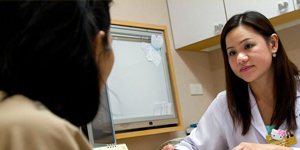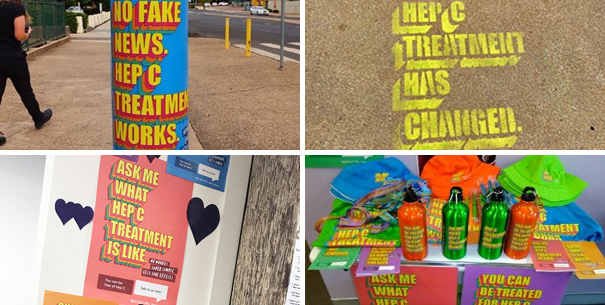The Champion #89 – October 2020
This issue:
- Korean language website launched
- Nobel prize in medicine awarded to trio for work on hepatitis C
- Clearing the Path… We’ve been everywhere!
- You never know where the hep C cure message will come from
- Viral hep treatment and policy must recognise affected communities
- Please help Hepatitis NSW test run our online AGM
- Expressions of Interest – Hepatitis Australia Community Board Member

Korean language website launched

Hepatitis NSW has launched a new hepatitis B Korean language website – hepB.org.au/Korean.
For many Korean people, there can be significant barriers accessing health information online, especially when the information is in English. Even where a site has information in Korean, if people feel it is directly translated from English, they might perceive it as not culturally relevant to them. This can result in people not taking the content seriously, dismissing the information and learning very little. This is amplified when the only way to engage and ask questions through an online chat function is in English.
For these reasons, our Korean hep B website, which is written in the Korean language, should be a very meaningful resource for the Korean community in New South Wales.
The site has a strong human touch, with personal stories of what it’s like to live with hepatitis B told by both Korean and Chinese people. There are also easy to read medical articles written by Associate Professor Alice Lee, with important messages about hepatitis and liver health. We have also introduced a chat function – like that on our main website – which is for anyone who wishes to ask questions about hep B and chat in Korean.
Following a soft launch, the site has been well received by the Korean community. The Grand Opening Hep B Quiz attracted over one hundred responses. Prizes have been sent to the winners 37 winners who answered all 18 questions correctly!
We have also launched a page on Facebook written in Korean to complement the site, and to build additional support for the Korean community in New South Wales – please like and follow!
Our new website will continue to grow and play an important role for Korean people who want information about hepatitis B and liver health.
Nobel prize in medicine awarded to trio for work on hep C

Three scientists have won the 2020 Nobel prize in medicine for their groundbreaking work on the blood-borne hepatitis C virus.
Harvey Alter at the US National Institutes of Health in Maryland, Charles Rice from Rockefeller University in New York, and Michael Houghton, a British virologist at the University of Alberta in Canada, have been honoured for their joint discovery of the hep C virus. Congratulation to these three scientists.
The hep C virus was discovered in 1989. Prior to that, it was associated with blood transfusions, but was called non-A, non-B hepatitis because the virus could not be identified. Their research and discovery led to blood tests for the virus – which was then named hepatitis C – reducing the likelihood of transmission through blood transfusions. Knowing about the virus, and how it was transmitted, also led to strategies to reduce the risk of transmission through injecting drug use, tattooing and other blood-to-blood means.
Following the discovery of the virus, the search began for a cure. Early ‘cures’ included various versions of interferon which was described as almost worse than the disease requiring intensive treatment regimens and low cure rates. The holy grail of cure was achieved in 2016 with direct acting antiviral medications. Unlike earlier treatments, DAAs come with few or no side-effects, can fully cure hep C within 8 or 12 weeks in more than 95% of cases.
It’s incredible to realise that it’s possible to discover and eliminate a disease in less than 50 years.
Clearing the Path… We’ve been everywhere!

♫♪ We needed to tell all people that hep C treatment had changed
So over Sydney and across rural New South Wales we ranged.
“Hep C treatment works” is what we had to say,
So to get the message out, we went all the way.
To NSPs, OSTs and clinics everywhere, our peers spread the word,
“Ask me what hep C treatment is like. You can be cured!”
♫♪ We’ve been everywhere,
Postered walls and street poles from here to there,
We’ve stencilled pavements far and wide,
With branded goodies at our side,
We’ve been everywhere!
♫♪ We’ve been to Brookvale, St Lennys, Redfern, Campsie, Camperdown, Newtown, Kings Cross, Surry Hills, Kings Cross, Kogarah, Wagga Wagga, Griffith, Tumut!
♫♪ We’ve been to Parra and North Parra, Blacktown, Mount Druitt, Blackett, Miller, Liverpool, Campbelltown, Fairfield, Bankstown, Wollongong, Lithgow, Penrith, St Marys!
♫♪ We’ve been to Nowra, Port Kembla, Woy Woy, Gosford, Wyong, Hamlyn Terrace, Killarney Vale, Coffs Harbour, Grafton, Kempsey, Bathurst, Wellington, Kelso!
♫♪ We’ve been to Port Macquarie, Lismore, Tweed Heads, Nimbin, Newcastle, Taree, Forster, Islington, Tamworth, Forbes, Parkes, Coomealla, Broken Hill, Orange!
♫♪ We’ve been to Queanbeyan, Eden, Goulburn, Narooma, Queanbeyan, Bega, Albury, Young, Windsor, Penrith, Katoomba, Dubbo!
♫♪ No fake news, we’ve been everywhere and hep C treatment works!
(Sung (kind of) to the tune of, I’ve Been Everywhere, Man)
Clearing the Path is a joint hep C cure campaign by Hepatitis NSW and NUAA>>> hepC.org.au. Peers probably won’t sing this song.
You never know where the hep C cure message will come from

It’s a whole different way of getting the message across.
On World Hepatitis Day – July 28, this year –a “Hep C Treatment Is Easy” banner was flown across the skies over Ballina, Byron, and Lismore. As it turns out, many people wrote down and shared both the message and phone number, which clearly stood out against the blue sky.
Lismore Liver Clinic reports they continue to see people who not only got the message on the day but then took steps to cure their hep C. Some people have said they didn’t know hep C could now be cured. Or that they had put off dealing with it. Or that they were worried they would have a difficult time on treatment. The clinic has treated many older locals, often with the support of family or friends. Many people had done interferon treatments in the past, without success, and had put hep C to the back of their minds.
After testing, some people who presented to the Lismore Liver Clinic, learned they no longer had hep C due to spontaneous clearing. The great news is that others have nearly finished their treatment and are feeling better. Even more excitingly, in just two months’ time need only one more test to know they’re hep C free.
The plane banner was part of the Hepatitis Australia “Test Cure Live” campaign, in partnership with the Northern NSW Local Health District and Hepatitis NSW.
Clarification – WHD 2020 media
In the August edition of The Champion we wrote of several media activities undertaken to promote World Hepatitis Day 2020, including a report on a WIN Illawarra segment. We inadvertently failed to acknowledge the efforts of Bill Lenane in making the event happen. We apologise to Bill for the oversight and put on record our appreciation for his big contribution in ensuring coverage of WHD 2020 in the Illawarra.
Viral hep treatment and policy must recognise affected communities

A new report from the UNSW Centre for Social Research in Health (CSRH) makes the case for health support services to fully engage with communities affected by viral hepatitis as a means of removing barriers to prevention and treatment.
The report – Annual Trends in Behaviour 2020: Viral Hepatitis in Australia – examines the changing landscape of hep C infection in Australia, with a focus on prevention, care, and treatment.
Standard public health structures don’t fully support the everyday health needs of communities affected by viral hepatitis, says the report. However, its authors note that approaches which give priority to communities’ needs, will result in a more targeted, practice-based approach to hep C cure.
The report finds that developing patient-reported measures for hep C treatment – in this case, people who inject drugs – allows for experiences and outcomes of treatment to be measured from the person’s perspective. Importantly, it also allows people from highly marginalised groups to have a say in, and negotiate, their care.
Despite the success of universal access to direct-acting antiviral (DAA) treatments introduced in 2016, the report found there remains many people living with hep C who either do not want, or cannot access, treatment. The report’s authors note that continued innovations in prevention are still needed for this reason.
An authorised peer distribution pilot program, to distribute sterile needles and syringes, has shown that key stakeholders (service staff, people who use drugs, and police) were strongly supportive of the initiative. The report explains that, while peer distribution is currently unlawful in most Australian settings, stakeholders believe such a program would reduce the transmission of hep C.
DAA treatments for hep C are widely promoted as having ‘few or no side effects’. However, the report found that distrust of public health by some people living with hep C meant that ‘cure is easy’ messaging was not necessarily effective. Concerns were underpinned by a general distrust and suspicion of medical institutions and the technology used, alongside continued widespread negative associations linked to the old interferon-based treatment.
Finally, the report also found, that negative attitudes of health workers towards members of affected communities, can manifest as discriminatory practice. This in turn acts as a barrier to providing good quality care. Previous research has shown that experiencing stigma or discrimination in health care settings correlates with negative effects for health outcomes. A stigma intervention project has been developed and is being piloted with a sample of the Australian public, this will be reported on upon completion.
- To read original story – UNSW Newsroom >>>CLICK HERE
- To read Trends in Behaviour on Viral Hepatitis in Australia Report >>>CLICK HERE
Please help Hepatitis NSW test run our online AGM

The Hepatitis NSW Annual General Meeting will be held in late November. As with many events this year, due to COVID-19, we will be holding it entirely online, via Zoom. We are reasonably comfortable and experienced with all things technical but, as the saying goes, “practice makes perfect”.
So we are seeking volunteers who can help us test run our AGM. Your involvement would really help us run a successful event.
Good test runs include both experienced and inexperienced people using a range of different devices (e.g. laptop, tablet and mobile phone), so we will be testing:
- Registration
- Voting and polling
- Cameras and microphones
- Muting
- File sharing
- Screen sharing
- Recording the meeting
- Internet and phone connections
- Different devices and apps.
We will be conducting several test Zoom meetings over a 2-3 week period. You wouldn’t have to be in all meetings, just the ones that you’re able to join. There is no obligation and you can opt-out at any time.
Whether you are new to computers or not, we’d really appreciate your help. Our aim is to complete our focus testing by November 13. Please forward this email on to any of your friends or relatives who have spare time and might also want to help out.
If you are interested or would like more information please contact:
Paul
email: [email protected]
mobile: 0412 885 201
Expressions of Interest – Hepatitis Australia Community Board Member

We are seeking applications from a person interested in joining the Hepatitis Australia Board as a Community Board Member to be appointed by at the 2020 Annual General Meeting for a two-year term.
To be eligible for this position you must be a financial member of Hepatitis NSW and living with or previously were living with hepatitis B or hepatitis C, or a member of a priority population for hepatitis B or hepatitis C.
The successful applicant will be offered a comprehensive board induction process, mentoring and opportunities for governance training.
If you are interested in joining the Hepatitis Australia Board, please contact Steven Drew, Chief Executive Officer, Hepatitis NSW by phoning 0402 518 285 or via email to [email protected] to discuss the position further and obtain a copy of the application pack.
Applications should be sent to Steven Drew, Chief Executive Officer, Hepatitis NSW via email to [email protected] no later than 5pm 20 October 2020.
For general information about Hepatitis Australia please visit www.hepatitisaustralia.com




